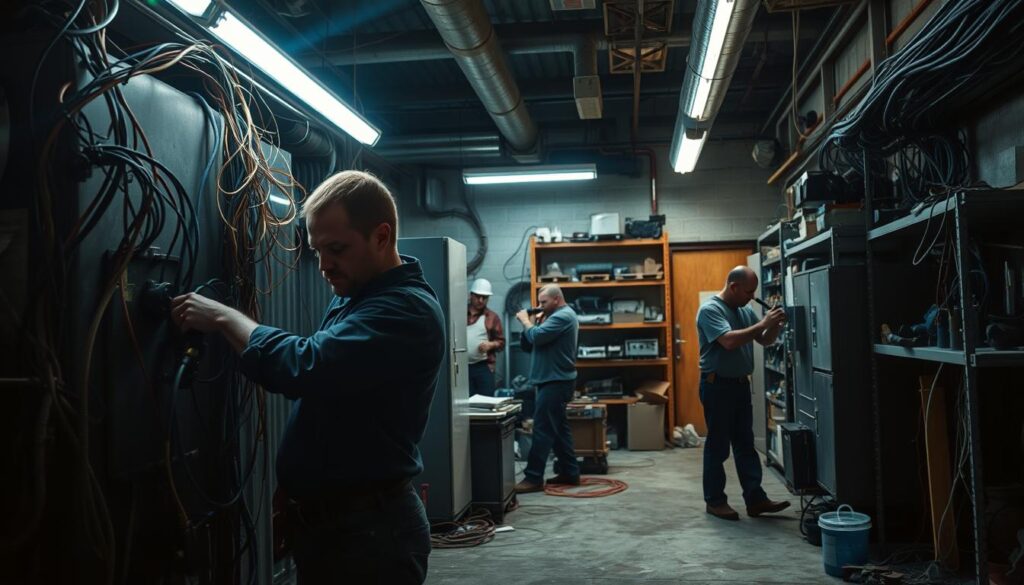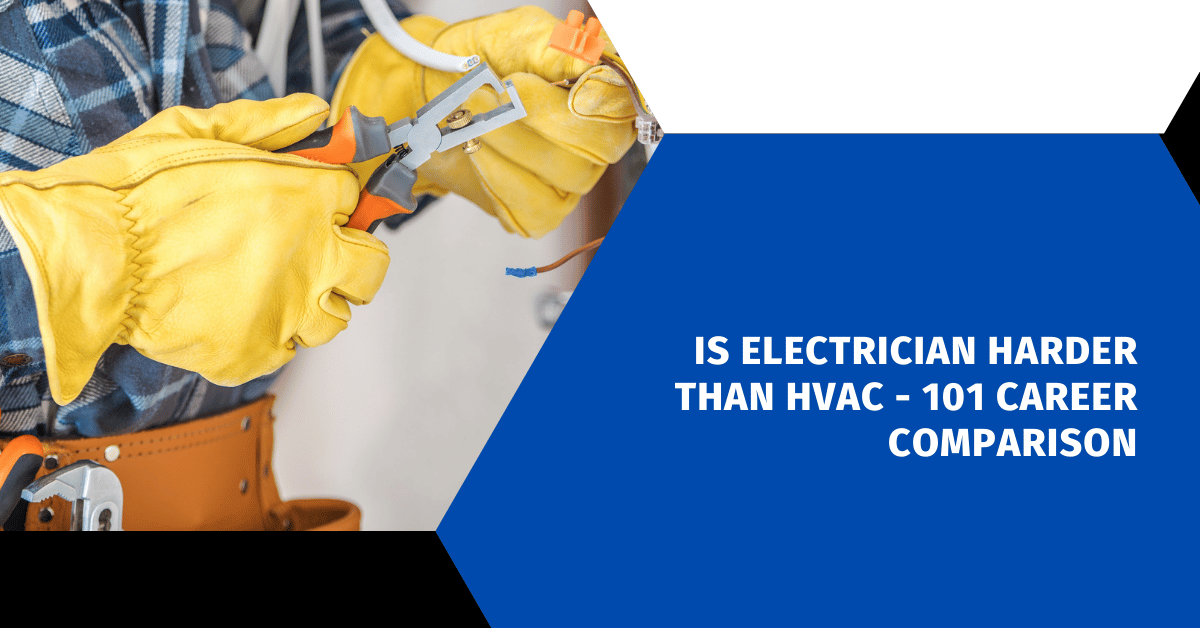Affiliate Disclosure
HVAC Guide Guys is a participant in the Amazon Services LLC Associates Program, an affiliate advertising program designed to provide a means for sites to earn advertising fees by advertising and linking to Amazon.
Is Electrician Harder Than HVAC? Are you thinking about which technical trade is more rewarding? The debate between electrician and HVAC careers is a big one. It’s something many aspiring tradespeople consider when planning their future.

Looking into trade skills, it’s key to understand the differences between electrician and HVAC work. Each job needs its own set of skills, technical knowledge, and training. These factors can greatly affect your career path.
Is electrician harder than HVAC? This question is complex. Both trades need a lot of technical know-how, physical strength, and ongoing learning. Your strengths, interests, and career goals will decide which path is right for you.
Key Takeaways
- Electrician and HVAC careers require specialized technical skills
- Both trades demand ongoing professional development
- Physical demands differ between electrical and HVAC work
- Career opportunity depends on individual skills
- Certification and licensing are critical in both professions
Table of Contents
Understanding HVAC and Electrical Work Fundamentals
The world of technical trades is complex, with HVAC and electrical work being at the core. These fields need a lot of technical skill to handle tough work environments. If you’re thinking about a career here or just want to know more, learning about their main tasks is key.
People in these jobs face special challenges. They need specific skills and a lot of knowledge to do their jobs well. Let’s look at what each job involves.
Core HVAC Technician Responsibilities
HVAC technicians handle important tasks in their work:
- Installing heating and cooling systems
- Performing routine maintenance checks
- Diagnosing mechanical and electrical problems
- Replacing defective components
- Ensuring optimal system performance
Essential Electrician Duties
Electricians are key in keeping electrical systems running smoothly. They do precise and detailed work:
- Installing new electrical systems
- Repairing existing wiring
- Troubleshooting electrical connections
- Reading and interpreting technical blueprints
- Ensuring compliance with safety regulations
Key Technical Skills Required
Both HVAC and electrical work need a lot of technical knowledge and hands-on skills. To succeed, you need:
- Advanced problem-solving capabilities
- Strong mathematical skills
- Comprehensive understanding of electrical systems
- Ability to interpret complex technical documentation
- Physical stamina and manual dexterity
Knowing these basics helps you see how much skill and effort is needed in HVAC and electrical trades.
Explore Our HVAC Shop
Looking for top-rated HVAC tools, parts, and accessories? Visit our shop and find the perfect solution for your needs.
Visit the ShopCareer Paths and Educational Requirements
Choosing a career in HVAC or electrical trades needs careful thought. You must understand the different paths for learning hands-on skills versus book knowledge. These technical fields have various educational routes to follow.
Both HVAC technicians and electricians have many ways to start their careers. Your main options include:
- High school diploma or equivalent
- Vocational school programs
- Community college technical courses
- Apprenticeship programs
- Online certification training
Training and certification differences are key to your career path. Apprenticeship programs are the most complete. They mix classroom learning with real-world experience.
| Education Path | Duration | Estimated Cost | Practical Experience |
|---|---|---|---|
| Vocational School | 6-24 months | $5,000 – $15,000 | Limited hands-on training |
| Community College | 2 years | $10,000 – $25,000 | Moderate practical skills |
| Apprenticeship | 4-5 years | Minimal to no cost | Extensive hands-on experience |
Your success in these fields depends on balancing theory and practice. Apprenticeships offer the best training. They let you earn while learning and gain real-world skills.
The most successful technicians combine academic learning with practical experience.
Choosing the right educational path depends on your goals, finances, and learning style. Think about your strengths and career goals when picking between training options.
Physical Demands and Working Conditions
Jobs like HVAC and electrical work need a lot of physical strength and toughness. Workers face tough environments and must stay safe and perform well.
Being good in trades is not just about knowing how to do things. You also have to handle different and sometimes hard working conditions. These tests your physical and mental limits.
Environmental Challenges
People in these jobs often face extreme conditions that are hard on the body:
- Crawling through tight attic spaces
- Working in scorching hot or freezing cold environments
- Climbing ladders and navigating challenging job sites
- Standing for extended periods
Tool Usage and Equipment Handling
Keeping safe in trades means managing tools well. You’ll need to:
- Lift heavy equipment weighing up to 50 pounds
- Maintain precise control of specialized tools
- Understand complex machinery operation
- Practice consistent equipment maintenance
Safety Considerations
Both HVAC and electrical work come with risks that need constant attention. Staying safe means knowing the dangers and following strict safety rules.
“In trades, your safety is your most valuable tool.” – Professional Tradesperson
Your success in these careers depends on being physically fit, mentally strong, and committed to safety at work.
Explore Our HVAC Shop
Looking for top-rated HVAC tools, parts, and accessories? Visit our shop and find the perfect solution for your needs.
Visit the ShopIs Electrician Harder Than HVAC: A Detailed Analysis
When we compare the skills needed for electricians and HVAC technicians, we see different challenges. Your choice of career depends on understanding these unique complexities.

- Advanced circuit understanding
- Strict safety protocol management
- High-precision diagnostic skills
- Constant technological adaptation
HVAC technicians face their own set of challenges. Their trade skill comparison shows unique complexities:
- Comprehensive system integration knowledge
- Climate control mechanism expertise
- Energy efficiency calculations
- Mechanical and electrical system interactions
“Each trade presents its own set of intellectual and physical challenges that test a professional’s capabilities.” – Industry Expert
Deciding if electrician work is harder than HVAC isn’t easy. Both trades need a lot of training, problem-solving, and learning. Your skills, physical strength, and interest in technology will decide which job is tougher for you.
Electrical work might seem harder because of the high voltage risks and complex wiring. HVAC technicians, on the other hand, work with advanced climate control technologies. They need to understand both mechanical and electrical systems well.
Training and Certification Differences
To become skilled in HVAC or electrical trades, you need specific training and certifications. Your career path depends on the technical skills needed for each trade. Becoming a certified technician involves education, tests, and ongoing learning.
Getting certified involves several key steps. These steps show your technical skills and dedication to your trade:
- Complete accredited training program
- Pass thorough written exams
- Meet practical experience needs
- Get state-specific licenses
HVAC Certification Process
HVAC technicians go through a structured certification path. Your training can be at vocational schools, community colleges, or through apprenticeships. Most programs last 1-2 years, teaching about refrigeration, electrical parts, and climate control.
Electrical Licensing Requirements
Electrical pros face more complex licensing rules. State rules differ, but usually include:
- 4-5 years of apprenticeship
- Passing state licensing exams
- Showing specific technical skills
- Keeping up with safety certifications
Continuing Education Requirements
Both HVAC and electrical fields need ongoing learning. Continuous professional development keeps you competitive and up-to-date with new industry standards.
Explore Our HVAC Shop
Looking for top-rated HVAC tools, parts, and accessories? Visit our shop and find the perfect solution for your needs.
Visit the ShopJob Market Outlook and Growth
Your career in electrical and HVAC looks bright. The U.S. Bureau of Labor Statistics shows great job outlook and earning chances. Electricians will see an 8% job growth from 2019 to 2029. HVAC technicians will see a 4% increase in the same time.
Several factors are driving the growth of these skilled trades:
- More demand for energy-efficient systems
- Construction and infrastructure projects keep growing
- New tech in electrical and HVAC systems
- Old systems and equipment need to be replaced
Job chances vary by region. Cities and areas with fast growth have more job openings for electrical and HVAC pros. Your pay can change based on:
- What area you specialize in
- How long you’ve been working
- Where you live
- Any extra certifications you have
New tech and green energy plans open up new jobs. Smart homes, renewable energy, and better climate control systems are creating more work for electricians and HVAC techs.
Staying up-to-date and learning new skills can really boost your career in these changing fields.
Salary Comparison and Career Advancement
When thinking about a career in HVAC or electrical trades, it’s important to know about job outlook and earning. Both fields offer good money and chances to grow.
Entry-Level Wages and Progression
Your starting salary can change a lot based on several things:
- Where you live
- How much demand there is for skilled workers
- How much training and certifications you have
- The company you work for
At first, HVAC and electricians usually make between $35,000 and $45,000 a year. But, as you gain experience, your salary can go up to $60,000-$85,000 a year.
Specialization Opportunities
Getting better at your job in these fields means learning specialized skills. Some areas that pay well include:
- Installing renewable energy systems
- Working on industrial automation
- Fixing commercial refrigeration
- Setting up smart home technology
Electricians who work on solar panels or industrial electrical systems can earn more. HVAC techs who work on complex commercial or green projects also get paid well.
Always keep learning and improving your skills to reach your full career goal in these exciting trades.
Explore Our HVAC Shop
Looking for top-rated HVAC tools, parts, and accessories? Visit our shop and find the perfect solution for your needs.
Visit the ShopDaily Challenges and Problem-Solving Requirements

Working in electrical and HVAC trades is tough. It needs great problem-solving skills and quick thinking. Every day, professionals face new challenges that test their knowledge and how they solve problems.
HVAC and electricians deal with big problems that need fast and smart solutions. They have to:
- Find and fix complex system problems
- Keep up with new technologies
- Fix tricky electrical and mechanical issues
- Handle sudden equipment failures
Electrical work brings its own set of challenges. It involves figuring out complex wiring and finding hidden electrical problems. Technicians use special tools and their deep knowledge of electricity to solve these issues safely.
HVAC work is also complex. It involves managing advanced climate control systems. Professionals must:
- Check how well the system works
- Find small problems that affect performance
- Offer the right technical fixes
- Make sure the system works perfectly
Critical thinking is key in these jobs. Your ability to solve complex problems is what makes you successful and safe in these fields.
Being good at problem-solving is more than just knowing the technical stuff. It’s about finding a smart way to tackle and solve tough technical challenges.
To do well in electrical and HVAC jobs, you need to keep learning, be flexible, and always be ready to solve complex problems.
Conclusion
When comparing electrician and HVAC careers, knowing your strengths is key. Is electrician harder than HVAC? It really depends on your skills, interests, and technical abilities.
Both careers have their own rewards and challenges. Your choice should match your skills, physical abilities, and career goals. Electrical work might need more precise technical knowledge. HVAC technicians handle complex system installations and maintenance.
Both trades have great growth opportunities in the U.S. Think about your comfort with electrical systems, mechanical equipment, and solving problems. Look into local job markets, apprenticeships, and salaries to choose wisely.
Success in either field needs hard work, learning, and a love for solving technical problems. Whether you pick electrical work or HVAC, both offer stable, fulfilling jobs in the skilled trades.

